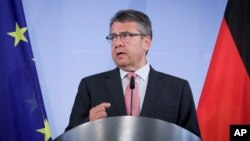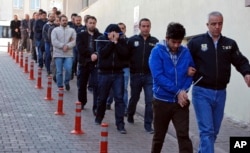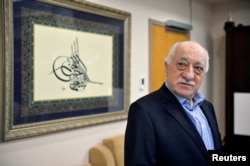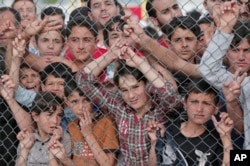Turkey has rejected German Foreign Minister Sigmar Gabriel's strong criticism Thursday of Ankara's detention of six human rights activists, including a German national.
Turkish presidential spokesman Ibrahim Kalin described the criticism as "unfortunate," but said Ankara remains committed to German-Turkish relations.
Gabriel criticized Ankara for detaining the rights activists and for a wider crackdown following a failed coup last year in Turkey. The German foreign minister announced a number of measures cautioning German nationals on the risk of visiting Turkey, and the dangers' of "arbitrary arrests."
The six activists are being held on suspicion of supporting a terrorist organization, a charge widely used in the detention of more than 50,000 people since Turkey's introduction of emergency rule. Ten German nationals have been detained in the crackdown so far.
Turkey appears to be downplaying Gabriel's comments. "We think that those unfortunate statements are about internal politics aimed at the approaching elections in Germany," Kalin said. Germany holds general elections in September.
Kalin also said that Turkey's judiciary was independent and that Germany's legal system unfairly treated Turkish citizens who have been accused of espionage.
Simmering tensions
German authorities have accused Turkish nationals, including imams sent by Turkey's religious affairs directorate, of spying on critics of Turkish President Recep Tayyip Erdogan. In 2015, three Turkish nationals were arrested for spying. Turkish media reported one of those detained was close to Erdogan.
Tensions have been simmering between the two NATO allies for several years, but last July's failed coup has brought those tensions to a boiling point. Ankara accuses Berlin of harboring people involved in the failed coup, while the German government counters that Turkish officials have failed to provide evidence to back their claims.
German Foreign Minister Gabriel also warned of the risks of investing in Turkey. The warning follows German media reports that Ankara has compiled a list of German companies operating in Turkey that are being investigated for links to suspected coup conspirators. Among them were industrial giants Daimler and BASF. Turkish officials have denied the reports.
Hundreds of Turkish companies, worth billions of dollars, have been seized under emergency rule because of alleged links to U.S.-based cleric Fethullah Gulen. Ankara blames Gulen for the failed coup. Gulen denies the allegation.
Germany is Turkey's largest trading partner, and many German companies have been based in the country for decades.
Turkish financial markets recorded only moderate falls following Berlin's threats. There are doubts that Berlin is prepared to follow through on the threats.
Sanctions could hurt both
"Trade is very lively between Turkey and Germany and the rest of Europe at the moment," said Semih Idiz, a political columnist at Al Monitor website. "But it's a double-edged knife, as any sanctions will hurt both sides."
Turkey's valuable tourism industry could be most vulnerable, according to analysts.
"The [German foreign minister's] advice to its own citizens it might not be safe to go to Turkey is kind of scary," said Atilla Yesilada, a political consultant for Global Source Partners. "It's not going to be good for tourism. Some of the late reservations could be affected; a lot of Europeans use Turkey as a last resort, so the effect could be substantial."
Yesilada says Berlin's warning that $3.4 billion in European Union aid could be at risk is more important. The aid is in exchange for Turkey controlling refugees entering Europe.
"The incentive for retaliation on the Turkish side would be immense, i.e., to relax the supervision of Syrian refuges allowing them to sail off to across the Aegean Sea to Greece, or cross the Turkish-Bulgarian border. That would mean all-out war between Turkey and EU," Yesilada said.
More than one million migrants escaping war and persecution in Africa and the Middle East crossed into Europe in 2015, the International Organization for Migration estimated.
Despite new pressure from Berlin, Ankara defends its crackdown and shows no sign of giving any concessions. "This week's Cabinet reshuffle sends a message. The foreign minister, interior minister, EU minister are all hardliners in supporting the crackdown, all kept their jobs. So a change is not on the books," Yesilada said.







